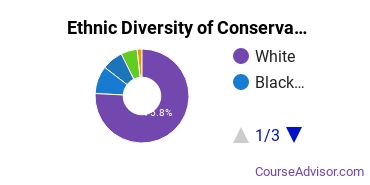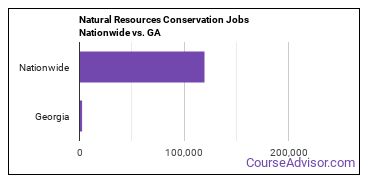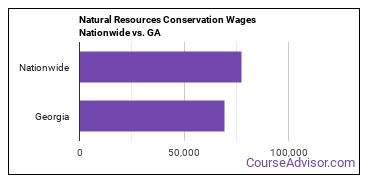Conservation Schools in Georgia
In 2022-2023, 227 students earned their Conservation degrees in GA.
As a degree choice, Conservation is the 97th most popular major in the state.
Education Levels of Conservation Majors in Georgia
Conservation majors in the state tend to have the following degree levels:
| Education Level | Number of Grads |
|---|---|
| Bachelor’s Degree | 172 |
| Master’s Degree | 43 |
| Award Taking Less Than 1 Year | 9 |
| Post-Master’s Certificate | 3 |
| Postbaccalaureate Certificate | 3 |
Gender Distribution
In Georgia, a conservation major is more popular with women than with men.

Racial Distribution
The racial distribution of conservation majors in Georgia is as follows:
- Asian: 2.6%
- Black or African American: 6.2%
- Hispanic or Latino: 7.0%
- White: 76.2%
- Non-Resident Alien: 2.2%
- Other Races: 5.7%

Jobs for Conservation Grads in Georgia
2,010 people in the state and 119,200 in the nation are employed in jobs related to conservation.

Wages for Conservation Jobs in Georgia
In this state, conservation grads earn an average of $69,390. Nationwide, they make an average of $77,580.

Most Popular Conservation Programs in GA
There are 11 colleges in Georgia that offer conservation degrees. Learn about the most popular 11 below:
56% of students are awarded financial aid at this school. Of all the teachers who work at the school, 74% are considered full time. Students who attend this private institution pay an average net price of $24,142.
Request Information97% of students are awarded financial aid at this school. The full-time teacher rate is 81%. Most students complete their degree in 4.26 years.
Request InformationOf all the students who attend this school, 94% get financial aid. This public school has an average net price of $17,993. Students enjoy a student to faculty ratio of 22 to 1.
Request InformationStudents enjoy a student to faculty ratio of 17 to 1. Of all the teachers who work at the school, 90% are considered full time. It takes the average student 4.27 years to graduate.
Request Information78% of the teachers are full time. It takes the average student 5.17 years to graduate. This public school has an average net price of $11,648.
Request Information91% of students are awarded financial aid at this school. The average student takes 4.47 years to complete their degree at UNG. 18 to 1 is the student to faculty ratio.
Request Information12 to 1 is the student to faculty ratio. It takes the average student 4.12 years to graduate. This private institution charges an average net price of $22,395.
Request InformationIt takes the average student 4.72 years to graduate. Of all the students who attend this school, 94% get financial aid. Students enjoy a student to faculty ratio of 23 to 1.
Request Information62% of the teachers are full time. Students enjoy a student to faculty ratio of 17 to 1. It takes the average student 4.78 years to graduate.
Request InformationIt takes the average student 4.13 years to graduate. The student to faculty ratio is 11 to 1. The full-time teacher rate is 67%.
Request InformationThe student to faculty ratio is 11 to 1. 100% of students are awarded financial aid at this school. 37% of the teachers are full time.
Request InformationConservation Careers in GA
Some of the careers conservation majors go into include:
| Job Title | GA Job Growth | GA Median Salary |
|---|---|---|
| Forestry & Conservation Science Professors | 29% | $76,920 |
Related Majors in Georgia
Below are some popular majors in the state that are similar to conservation.
| Major | Annual Graduates in GA |
|---|---|
| Forestry | 103 |
| Wildlife Management | 52 |
| Natural Resource Management | 43 |
View all majors related to Conservation
Explore Major by State
Alabama
Arkansas
Connecticut
Florida
Idaho
Iowa
Louisiana
Massachusetts
Mississippi
Nebraska
New Jersey
North Carolina
Oklahoma
Rhode Island
Tennessee
Vermont
West Virginia
View Nationwide Conservation Report
References
- College Factual
- National Center for Education Statistics
- O*NET Online
- Image Credit: By Lynn Betts under License
More about our data sources and methodologies.







